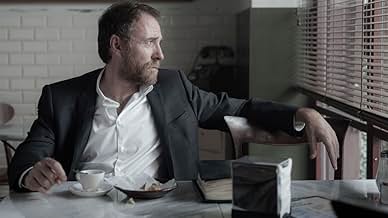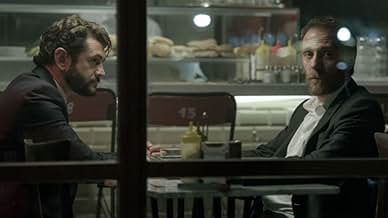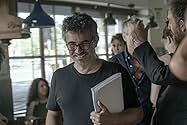Not since My Dinner with Andre can I recall a film set in a single location - now we have this 2017 Italian film The Place, a cafe by that name in which a distinguished-looking fiftyish man holds court at a back table. Supplicants come to him with the problems that most deeply disturb them, and he flips through his thick handwritten notebook to one of the red ribbons - the kind you'd see in a Bible to mark a verse - and tells them what act will bring about what they want.
These acts have nothing to do with their problems - a woman who wants to be prettier is told to steal a very specific amount; a blind man is told that raping a woman will give him sight. But once he pronounces an oracular "deal" he has no alternate solution. They are free not to accept it, or to follow through, but each of them wants their outcome strongly enough to make their pact - at least to begin with.
They stop by to report on their progress, which he records in his notebook. The tasks he assigns often overlap, either by his design or by some hand of providence, and some people get what they ask for, some change their minds and drop the whole thing, and some try to convince him they did as he said - but he tells them they didn't. "How do you know?" A man of few words, he doesn't answer, but we know that they didn't. If they had, something about them would be different.
He is an enigma - we learn the names of some characters, but even in the credits he is Uomo (the Man). He's at The Place when they're setting up in the morning, he's there when the waitress is mopping up at night. As she probes, he admits he doesn't sleep much. We don't see him arrive, we don't see him leave. Sometimes The Place is crowded, other times he's the only customer, and the chairs are upside down on every table except his. Why doesn't he get kicked out? What's his source of funds? He eats and drinks all day, but we never see him pay.
For a man intent on details, he offers few of his own. His supplicants ask him questions, including "Who are you?" which he deflects, returning to why they have come. One character accuses him of being Satan, which he neither confirms nor denies. He displays a lordly indifference to what they think of him - his only concern, once he's assigned their task, is what steps they're taking to complete it.
Is his purpose to awaken conscience, or to demonstrate to people that their desires blot out their morality? Or is he an evil being with the power to grant people's wishes - as long as he gets in trade their compromised integrity? Or is he simply a mirror of a self-absorbed culture in which our happiness is so important we're willing to destroy someone else's to get it?

![Regarder Trailer [OV]](https://m.media-amazon.com/images/M/MV5BMGYwOGJlOTUtNjI2Yi00YjE4LTk2MjItMzFiMmIzOGJjMzNjXkEyXkFqcGdeQXRodW1ibmFpbC1pbml0aWFsaXplcg@@._V1_QL75_UX500_CR0)
![Trailer [OV]](https://m.media-amazon.com/images/M/MV5BODk1NGI5OGMtZDQ0My00MjhlLTgxODctZmJlZjVhMWU5YWEyXkEyXkFqcGdeQXRodW1ibmFpbC1pbml0aWFsaXplcg@@._V1_QL75_UX500_CR0)






























